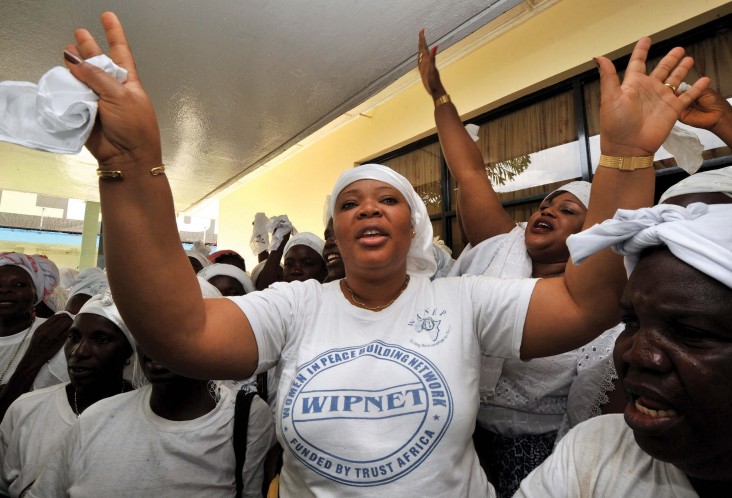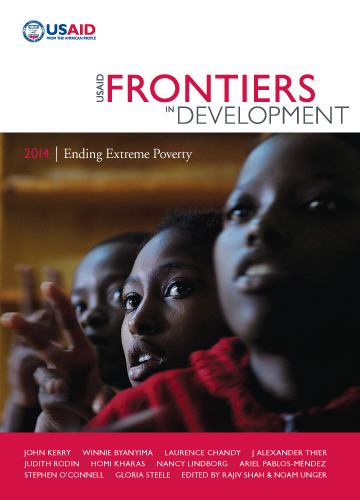John Ellis
The goal of development assistance is to make itself obsolete. As President Obama said in launching the Feed the Future initiative: “The whole purpose of development is to create the conditions where assistance is no longer needed, where people have the dignity and the pride of being self-sufficient.”
Eradicating extreme poverty depends largely on social capital—the behavioral norms and networks that shape opportunities and incentives for collective action.1 Social capital is formed on the basis of generalized trust and “obligations of reciprocity within a social network.”2 In many fragile and impoverished societies, trust and reciprocal responsibility are not generalized. Rather, they are confined to small, personalized clan or patronage groups, and are weak or entirely absent in the broader networks and organizations that must work together to drive and sustain the development process.3

As a result, local governments, businesses and civil institutions suffer critical information and cooperation failures, both within and among the individual organizations. These failures prevent them from collaborating to achieve common goals.
In the past, development practitioners tended to attribute the poor performance of these networks and institutions to shortages in technical knowledge and skills. On this basis, we focused our assistance on educating and training key individuals, expecting this education and training to translate directly into improved performance.
We hypothesized that improvements in human capital (the capacity of the individual) would automatically improve institutional capacity and assumed that the generalized, inclusive social capital required for collective action either already existed or would take care of itself.
Insights from Liberia and beyond
USAID’s experience in Liberia challenges these assumptions. In May 2013, the USAID mission and the Liberia Institute of Public Administration conducted a workshop to identify lessons from recent programs that were designed to strengthen systems and build capacity.
Many Liberian participants expressed deep frustration with the difficulties they faced in trying to improve the performance of the organizations in which they worked.
For example, individuals who had left to earn graduate degrees encountered jealousy and outright hostility from their colleagues when they returned. Supervisors continued to operate within close ethnic and family circles instead of enlisting competent individuals outside of their personal circles. Leaders trusted expatriate consultants more than their own subordinates to accomplish routine tasks. Improved human capital did not necessarily translate into better performance by individuals or organizations.
Workshop participants concluded that social and behavioral issues, as much as the shortage of technical capabilities, were affecting the quality of their organizations’ services. Governments did not perform because government employees would not work together to solve problems and did not have a shared commitment to their collective goals.4 Confirming the insufficiency of individualized technical training to address this problem, a donor representative remarked that these behavioral issues limited the country’s ability to utilize its scarce human capital.
This suggests that assistance should focus at least as much on accumulating social capital—helping to expand and strengthen local networks of generalized trust and collaboration—as it does on improving human capital. Donors should revisit social capital as they provide assistance at local and micro levels—building the capacity of a farmers’ association to efficiently meet the needs of its members, for example—and at macro levels, such as building the capacity of ministries of public works and finance to plan and implement large public infrastructure investments.
Assistance should focus at least as much on accumulating social capital—helping to expand and strengthen local networks of generalized trust and collaboration—as it does on improving human capital.
Researchers have observed that prosperity is directly dependent on the emergence of complex networks of human communication, collaboration and exchange, which exponentially multiply the benefits of each individual’s contributions to the development process.5
Long before the Industrial Revolution, for example, societies in Western Europe and Asia had developed elaborate social technologies for increasing individuals’ productivity, such as enforcing quarantine laws and quality standards for farm products and establishing joint stock companies and professional guilds.6 The extent to which such institutions were “extractive” or “inclusive” has had a critical bearing on each society’s development trajectory.7
Through direct field experience, researchers and practitioners have learned that neglect of social capital greatly increases the risk that development assistance will fail to yield sustainable results. “Transplanted” legal systems, for example, are unlikely to be effective if they do not align with local institutions.8 Even practices as apparently mundane as financial management standards will not be adopted when they conflict with pre-existing perceptions and behavioral norms.9
The drive toward localized experimentation through randomized control trials reflects recognition of an important finding: that the impact of different development solutions may vary significantly based on the dominant institutions of their target populations.
Fortunately, we are learning how to address this challenge. For example, USAID’s tools for strengthening local systems and developing institutional capacity help build broad and inclusive forms of social capital—such as generalized trust and reciprocity obligations. The tools also help address counterproductive perspectives, norms and behaviors. USAID also has mainstreamed behavior change communications and social marketing interventions into its health sector practice.
In Liberia, our work with the Ministry of Health and Social Welfare demonstrates the potential of these approaches. Under USAID Forward’s Implementation and Procurement Reform initiative, USAID and the Government of Liberia in 2010 agreed to implement through the Ministry public health services previously managed by USAID’s expatriate contractors and grantees.
Significant internal communications and coordination challenges threatened the Ministry’s ability to deliver these services. In response, mission staff and contractors with extensive experience in strengthening health systems facilitated collective action, convened meetings between different Ministry offices, mediated discussions and fostered consensus-building.
The impact of these direct interventions was complemented by the structure of the agreement, which stipulated that USAID reimburse the Ministry only after the Ministry delivered the covered health services. This appeared to increase incentives for the Ministry’s employees to collaborate with one another.
The mission feels encouraged that this combination of direct engagement and supportive incentive structures appears to be bearing fruit. Despite lingering technical constraints, Ministry staff members now initiate their own problem-solving processes, collaborate with one another to develop solutions and no longer depend on USAID to move projects forward. The initiative has expanded local networks of trust and shared responsibility and made them more inclusive and effective. In President Obama’s words, the participants in this project enjoy the dignity and pride of being more self-sufficient.
Implications for practitioners
What does this mean for USAID’s development assistance programs?
First, we must acquire more knowledge about each country’s social and institutional environment as we design and implement poverty reduction projects. USAID’s Sustainability Toolkit, which many missions rely on for new project design, is a good starting point.
Unfortunately, the rigor of our analysis varies considerably. Many project designs overlook important assumptions, such as the will for policy reform or farmers’ willingness to change lifelong practices on the basis of demonstration projects supervised by strangers. We need to more carefully examine our assumptions about local ownership.
Second, we need to develop—through honest and open dialogue with our host country partners—explicit strategies for influencing norms and behaviors that constrain collective problem-solving. In some situations, this may be controversial. Some critics and practitioners of foreign assistance considered this type of engagement morally offensive, because by definition it engages outsiders to influence local social and cultural development. At the same time, this practice is already broadly accepted in certain areas, such as efforts to change local values and behaviors related to health, sanitation and human rights.
As the Liberian participants in our capacity-building workshop recognized, the development of social capital may often be a precondition for project success. Extractive patronage systems that capture public resources for private gain, for example, cannot and will not deliver quality infrastructure and agricultural extension services to impoverished populations. If we and our local partners neglect the social roots of such failures, then our efforts to eradicate extreme poverty and achieve other development goals may fail.
Third, we need to develop or tap into specialized expertise in the field of institutional and behavioral change. A highly developed branch of business advisory services exists in the United States, producing dozens of materials, like “how-to” manuals and books, on this subject every year. Behavioral economics, which aims to understand how psychological, social and emotional factors shape individual and societal economic decision-making, is another growing area of academic research.
Behavioral science techniques have been successfully applied to collective action challenges in the United States, including the State of Texas’ “Don’t Mess with Texas” public outreach campaign. The campaign employed carefully designed psychological “subsidies” and “taxes” to discourage Texans from littering their highways.10 Similar techniques could be applied to a range of critical development problems in USAID’s partner countries.
In essence, we should strive to nurture “tipping points” for social behaviors that are conducive to development,11 catalyzing the institutional “epidemics” that only take hold when supported and advocated by a large number of institutional entrepreneurs within their own social frameworks.12
When this happens, new practices and technologies that depend on complex coordination and collaboration—such as modern public financial management systems, mobile money networks and production systems for nutritionally fortified food products—can have true local ownership. Sustainability is better ensured, providing a solid foundation for scaling up project results. Most important, this approach cultivates the social capital critical for achieving President Obama’s ultimate goal of self-reliance.
John Ellis is USAID/Liberia’s supervisory program officer. The views expressed in this essay are his own and do not necessarily represent the views of the United States Agency for International Development or the United States Government.
1 Michael Woolcock, Social Capital: Implications for Development Theory, Research and Policy, World Bank, 1999, p. 3.
2 Francisco Herreros, The Problem of Forming Social Capital: Why Trust? Palgrave-Macmillan, 2004, p. 7.
3 David Booth, Development as a Collective Action Problem, Addressing the Real Challenges of African Governance, Africa Power and Politics Program, 2012, p. 11. In many societies, the traditional social norms that have supported effective collective action in the past, such as respect for the authority of chieftains, elders and “secret societies,” have broken down without being replaced by new forms of social capital. Clan chiefs in Liberia complain, for example, that they no longer have the authority to mobilize local labor to maintain community infrastructure because their people now consider such unpaid labor to be a “violation of human rights.”
4 William Easterly and Jessica Cohen, eds., What Works in Development: Thinking Big and Thinking Small, Brookings Institution, 2009, Kindle edition, loc. 169.
5 Ricardo Hausmann, Cesar Hidalgo, et al. The Atlas of Economic Complexity: Mapping Paths to Prosperity, Center for International Development, Harvard University, 2011. Accessed online on April 13, 2014 at http://atlas.cid.harvard.edu/media/atlas/pdf/HarvardMIT_ AtlasOfEconomicComplexity_Part_I.pdf.
6 Douglass North, Understanding the Process of Economic Change, Princeton University Press, 2005. Eric Jones, The European Miracle, Cambridge University Press, 3rd edition, 2003.
7 Daron Acemoglu and James Robinson, Why Nations Fail: The Origins of Power, Prosperity and Poverty, Crown Publishers, 2012.
8 Daniel Berkowitz, Katharina Pistor, Jean-Francois Richard, Economic Development, Legality and the Transplant Effect, 2001.
9 Matt Andrews, The Limits of Institutional Reform in Development: Changing Rules for Realistic Solutions, Cambridge University Press, Kindle edition, 2013.
10 Dale T. Miller and Deborah R. Prentice, Psychological Levers of Behavioral Change, Eldar Shafir, ed., The Behavioral Foundations of Public Policy, p. 303.
11 Malcolm Gladwell, The Tipping Point: How Little Things Can Make a Big Difference, Little Brown and Company, 2002.
12 Andrews, op cit. Kindle edition, loc. 2594 ff.
Frontiers in Development
Section 2: Politics, Global and Local








Comment
Make a general inquiry or suggest an improvement.